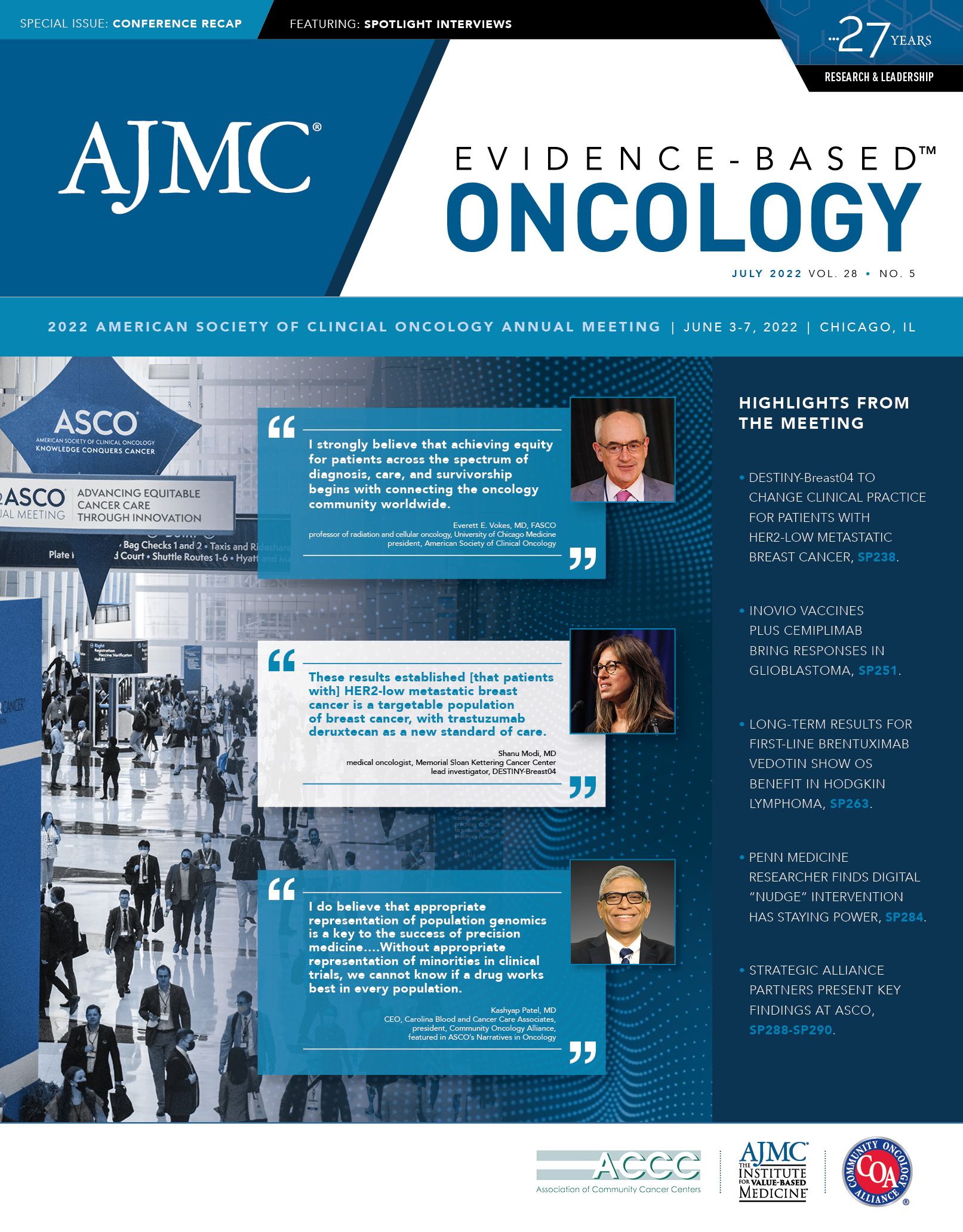- Center on Health Equity & Access
- Clinical
- Health Care Cost
- Health Care Delivery
- Insurance
- Policy
- Technology
- Value-Based Care
ASCO Spotlight With Randall A. Oyer, MD: Clinical Trials Must Be Accessible to Everyone
Randall A. Oyer, MD, medical director of the Ann B. Barshinger Cancer Institute, medical director of oncology, and medical director of the Cancer Risk Evaluation Program, Lancaster General Health, discusses recommendations to improve diversity in clinical trials.
The theme of the 2022 American Society of Clinical Oncology (ASCO) Annual Meeting was “Advancing Equitable Cancer Care Through Innovation.”
Randall A. Oyer, MD, medical director of the Ann B. Barshinger Cancer Institute, medical director of oncology, and medical director of the Cancer Risk Evaluation Program at Lancaster General Health in Pennsylvania, talked to Evidence-Based Oncology® (EBO) about the recent ASCO/Association of Community Cancer Centers (ACCC) recommendations for improving diversity in clinical trials, which also were discussed at the meeting.
Oyer is lead author on a paper on increasing racial and ethnic diversity in cancer clinical trials, recently published in the Journal of Clinical Oncology.1 He is also a clinical professor of cancer biology at Penn Medicine in Philadelphia, Pennsylvania, and past president of ACCC.
EBO: Have you noticed changes even ahead of these recommendations?
Oyer: In April, the FDA issued draft guidance for industry that a race and ethnicity diversity plan is recommended for all medical products for which an IND [investigational new drug] submission is required and for clinical studies that support a marketing submission.2 Sponsors are given guidance to discuss a race and ethnicity diversity plan with the FDA as soon as practical in the process and at any interval along the way. Sponsors are also asked to define enrollment goals and methods that they will use as part of a trial to make sure that the diversity goals are met.
Additionally, the American Cancer Society, NCCN [National Comprehensive Cancer Network], and the National Minority Quality Forum recently joined forces to create an institutional and practice equity report card that calls out the need to offer clinical trials to all cancer patients and calls out that staff training is needed to reduce barriers. And ASCO and Friends of Cancer Research have also issued a joint statement to broaden clinical trials eligibility. It’s already happening; the awareness is here. And it is really a top agenda item for every cancer organization to increase diversity and make equity a real cornerstone of what we do in cancer medicine.
We’re not going to be where we want to be in cancer care, nor where we know we can be in cancer care, without improving on clinical trials, and improving on clinical trials means that they’re accessible to everyone.
EBO: What is the role of community oncology practices in promoting greater diversity in clinical trials?
Oyer: In the United States, most cancer patients receive their care in the community setting rather than in the academic medical center, which means that clinical trials need to be brought directly to the communities where patients are receiving their care. Yet 75% of the problem with patients not being offered clinical trials is because a matching clinical trial is not available where a patient is being treated.
Community practices now understand that cancer treatment trials are a component of high-quality care, and we see community practices investing in people, systems, and training to work with an academic partner, to work with industry, or to be part of a cooperative group that can make relevant trials accessible to patients in their communities. ACCC and ASCO are also recommending forming solid partnerships in every community, with patients, patient advisory groups, and with community organizations and leaders.
EBO: What role do payers specifically play in bringing greater diversity to the research process?
Oyer: Well, payers can and must allow their customers and beneficiaries to participate in clinical trials. They must cover trial expenses to the same extent that they cover standard of care. No policy should exclude clinical trials.
EBO: Is there a specific role for CMS in this process?
Oyer: CMS can make clinical trial participation, I believe, one of the quality metrics that they follow, measure, report on, and value through an advanced payment model. It has been a quality component of the Oncology Care Model, the now 6-year pilot project that’s just coming to a close.
References
1. Oyer RA, Hurley P, Boehmer L, et al. Increasing racial and ethnic diversity in cancer clinical trials: an American Society of Clinical Oncology and Association of Community Cancer Centers joint research statement. J Clin Oncol. Published online May 19, 2022. doi:10.1200/JCO.22.00754
2. Diversity plans to improve enrollment of participants from underrepresented racial and ethnic populations in clinical trials; draft guidance for industry; availability. FDA. Updated April 13, 2022. Accessed June 14, 2022. https://www.fda.gov/regulatory-information/search-fda-guidance-documents/diversity-plans-improve-enrollment-participants-underrepresented-racial-and-ethnic-populations

HEDIS Glycemic Goal Achieved Using Control-IQ Technology
December 22nd 2025A greater proportion of patients with type 1 diabetes who used automated insulin delivery systems vs multiple daily injections achieved the Healthcare Effectiveness Data and Information Set (HEDIS) glycemic measure.
Read More
Linking Data to Determine Risk for 30-Day Readmissions in Dementia
December 22nd 2025This study found that certain characteristics in linked electronic health record data across episodes of care can help identify patients with Alzheimer disease and related dementias at high risk of 30-day readmissions.
Read More
